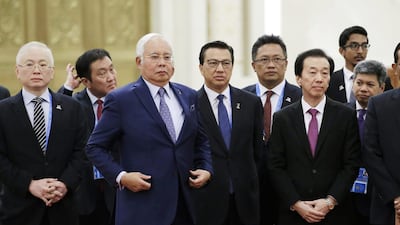This week's Belt and Road Forum, taking place in Beijing, is an important milestone in the development of China’s historic effort to transform the economies of the old Silk Road, strengthen links between them and better connect them to the rest of the world. The UAE strongly supports this Belt and Road initiative, which will foster economic growth and security both regionally and globally.
In the four years since president Xi Jinping launched this far-sighted project, there has already been substantial progress.
During this period, China has directly invested more than $50 billion (Dh13tn) and created the Asia Infrastructure Investment Bank, a new multilateral institution designed to finance vital public works throughout Asia’s emerging economies. The UAE is a founding member of the AIIB and committed to its central mission of bringing the Belt and Road vision to life.
China’s approach to economic development mirrors our own. We share the same core beliefs in the essential connection between trade, peace and prosperity. For both our peoples, these beliefs go beyond stated principles to concrete actions, best expressed by the strength of our bilateral trade, which has grown dramatically – almost 800-fold in the three decades since we established formal relations – from $63 million in 1984 to more than $50 billion per annum in 2016.
In fact, our cultural and economic ties with China go back centuries. Records of a pearl and porcelain exchange between the Gulf and China date from the seventh century. Today’s trade spans multiple sectors, but one of the most important is energy, the essential enabler of economic growth along the Belt and Road corridor.
Recognising that energy demand within Belt and Road countries will grow 50 per cent by 2040, both China and the UAE have made strategic co-investments in this sector.
China National Petroleum Company and China Energy recently took a minority share in UAE’s onshore oil reserves, beginning a partnership with the Abu Dhabi National Oil Company that will secure oil supplies for decades and ease market access for essential and higher value products throughout the region.
Adnoc's petrochemical company, Borouge, is celebrating seven years of operations in China during which trading volume has quadrupled.
Borouge is gearing up for market growth both within China and the countries along the Belt and Road corridor, where demand for petrochemicals and plastics, including essential utility piping and cable insulation, is expected to more than double by 2040.
In addition to fuelling and laying the foundational infrastructure of the Belt and Road region, connecting it to the rest of the world is also a critical aspect of this groundbreaking exercise in economic development. At the pivot point between Asia, Europe and Africa, the UAE is ideally located as a logistical hub that can facilitate trade to and from Belt and Road countries.
DP World’s Jebel Ali port is the largest in the Middle East and Abu Dhabi Ports Company is one of the fastest growing. Last year, ADPC partnered with China’s shipping giant Cosco to build a new terminal at Khalifa Port that will double cargo capacity, further expanding the flow of commerce between the Belt and Road region and the world’s other major trading blocs. As the Belt and Road region looks to extend its footprint into Africa, the UAE represents a natural nexus for developing mutually beneficial trading links.
The 65 countries of the Belt and Road region currently represent 30 per cent of global GDP. By 2040, they will account for almost two-thirds, thereby becoming the world’s most significant driver of economic growth. Making the right investments now will ensure this growth remains sustainable and more evenly spread.
In short, the success of the Belt and Road initiative can provide the foundation for a more secure, prosperous and progressive future for the world throughout the rest of this century and beyond.
HE Dr Sultan Ahmed Al Jaber is Minister of State and group chief executive of Adnoc

